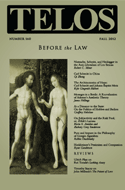Qi Zheng’s “Carl Schmitt in China” appears in Telos 160 (Fall 2012). Read the full version online at the Telos Online website, or purchase a print copy of the issue here.
 This essay explores the justification for studying Schmitt’s theory in China. It reveals the reasons why political philosophers who are interested in philosophical contributions to practical life should consider Schmitt’s theory as relevant for China. The first and second sections separately explore the two different schools of the critique of Schmitt in China. One school criticizes Schmitt either as a fascist theorist or a political philosopher whose theory is uncomfortably similar to the theory of Mao’s that directly produced the Great Cultural Revolution. I define this school as advancing a strong critique of Schmitt. The other school advances a weak critique of Schmitt. The weak critics aim to demonstrate a complicated relationship between Schmitt’s theory, liberalism and Chinese liberalism. On the one hand, they usually acknowledge the significance of Schmitt’s theory for showing the importance of the role of a strong state that is greatly ignored by Chinese liberalism. On the other hand, they criticize Schmitt for underestimating the ability of liberalism to build a strong state. In contrast to these two schools of Chinese criticism of Schmitt, the third and fourth sections of this essay provide a justification for studying Schmitt’s political theory in the current Chinese context by analyzing the inability of Chinese liberalism to provide the theoretical resources to deal with real political problems faced by China today.
This essay explores the justification for studying Schmitt’s theory in China. It reveals the reasons why political philosophers who are interested in philosophical contributions to practical life should consider Schmitt’s theory as relevant for China. The first and second sections separately explore the two different schools of the critique of Schmitt in China. One school criticizes Schmitt either as a fascist theorist or a political philosopher whose theory is uncomfortably similar to the theory of Mao’s that directly produced the Great Cultural Revolution. I define this school as advancing a strong critique of Schmitt. The other school advances a weak critique of Schmitt. The weak critics aim to demonstrate a complicated relationship between Schmitt’s theory, liberalism and Chinese liberalism. On the one hand, they usually acknowledge the significance of Schmitt’s theory for showing the importance of the role of a strong state that is greatly ignored by Chinese liberalism. On the other hand, they criticize Schmitt for underestimating the ability of liberalism to build a strong state. In contrast to these two schools of Chinese criticism of Schmitt, the third and fourth sections of this essay provide a justification for studying Schmitt’s political theory in the current Chinese context by analyzing the inability of Chinese liberalism to provide the theoretical resources to deal with real political problems faced by China today.








